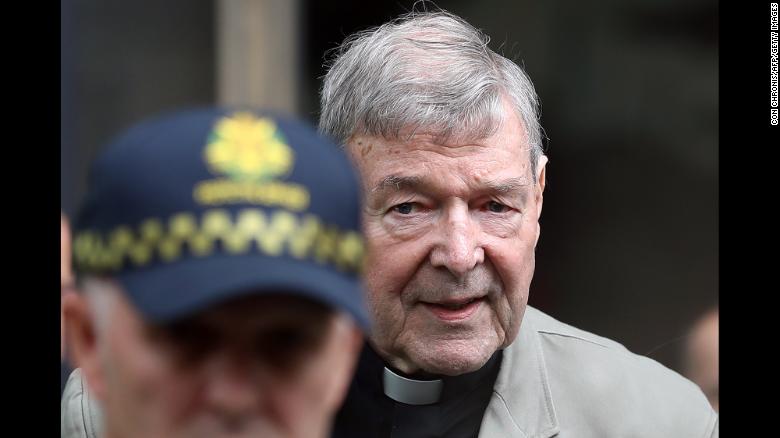Cardinal Pell’s lawyers seek to free convicted sex attacker on appeal

Pell, 77, arrived at Victoria’s Supreme Court Wednesday where his barrister, Bret Walker SC, will try to persuade a panel of appeal judges to overturn his conviction on three grounds, including that the guilty verdict was “unsafe,” because the evidence could not have convinced a jury beyond reasonable doubt. The proceedings, which are listed for two days, will be livestreamed.Pell was sentenced to six years in prison in March for what Judge Peter Kidd described as a “callous” attack on two choirboys at Melbourne’s historic St. Patrick’s Cathedral in the mid-1990s, when he was archbishop of that city. The former Vatican treasurer was found guilty of one charge of sexual penetration of a child and four charges of an indecent act with or in the presence of a child in the late 1990s during a secret trial late last year. The verdict was suppressed until February to avoid prejudicing a possible second trial, which did not go ahead.The other appeal grounds are that Judge Kidd did not allow Pell’s lawyers to show a “moving” video during summing-up, which they say would have detailed their version of events, and that Pell was not given the chance to enter a not guilty plea in front of the jury, as legally required. The two latter grounds are unlikely to prompt a retrial, said Jeremy Gans, a professor from Melbourne Law School, because even if errors were made during the trial, the judges would also have to find that they caused a “substantial miscarriage of justice.” But Gans said the “unsafe” claim had a “good chance” of succeeding. “The test in Australia for whether a verdict is unsafe is the judges have to decide for themselves whether they are left in doubt by the evidence,” said Gans, who has studied details of the case, except for video of the victim’s testimony, which was played to a closed court. “No matter how good (the victim’s) testimony is — and there’s every reason to think it was really good testimony, (as) it convinced the jury and he stood up to questions — that only takes you so far when someone’s describing a couple of minutes’ worth of events that no one else saw,” Gans said. If two of the three appeals court judges agree that, based on the evidence, there is doubt about the guilty verdict, the most senior Catholic official ever to be convicted of sexual abuse could be freed. Abuse survivors would be devastated if Pell’s conviction were overturned, said Helen Last, founder of the clergy abuse victim support group In Good Faith Foundation, who is now an independent advocate for victims of institutional sexual abuse. The Royal Commission into Institutional Responses to Child Sex Abuse in Australia found that it can take decades for child sex abuse victims to come forward. Pell’s conviction had given other victims of clerical sex abuse hope that their stories would be believed, Last said. “If the appeal is squashed then survivors will know they will be supported by legal structures. And if it isn’t, there’ll be a renewal of the conviction needed to keep finding ways to ultimately secure justice,” she said.One way could be through the Vatican’s own investigation into Pell. If the cardinal is found to have acted inappropriately, that could lead to him losing his clerical status or being “defrocked,” a severe punishment imposed by the Pope that is not subject to appeal. Pell’s appeal hearing is listed for two days on June 5 and 6 and it is not known whether the judges will release their ruling the same week. They could announce it at a later date, along with their reasons. If either side is unhappy with the outcome, they can apply to have the case heard by Australia’s High Court, the final avenue for legal appeal.Boy’s secret shared with courtPell was convicted last December after a secret five-week trial that required witnesses to recall details from over 20 years ago, including events after one Sunday morning mass in inner-city Melbourne. A man now in his 30s gave evidence that Pell had caught himself and a fellow choirboy, both aged 13, drinking altar wine in the priest’s sacristy after mass. The court heard that Pell blocked their exit from the room and forced them, one after another, to engage in sex acts.No one else saw the attack or noticed that the choirboys were missing. The incident took six minutes. During sentencing, Judge Kidd said Pell had shown “callous indifference to the victims’ distress,” telling them to stop crying as they sobbed and asked him to let them leave. Pell has maintained his innocence, calling the claims “a product of fantasy.”The victim who gave evidence kept the attack secret until 2015, when he said he felt compelled to report it to police after attending the second victim’s funeral. The second victim died from an accidental heroin overdose at the age of 31, after years of drug addiction, which his family said started soon after the attack. Neither person can be named under Australian law. A first trial earlier last year ended in a hung jury after jurors failed to reach a verdict. In the second trial, the jurors returned their verdict in just over three days. At the time, victim support groups cheered the decision as a victory for abuse survivors who claim the Catholic Church has frustrated their attempts to seek justice for crimes committed against them as children by priests. The Australian church’s appalling record on child sex abuse was exposed during the five-year Royal Commission inquiry, which found 7% of Catholic priests in the country had been accused of sexual abuse. The Commission’s final report, released in December 2017, made about 20 recommendations to the Church, but while Church leaders said they would accept “98%” of them, they refused to remove the seal of confession. Under Roman Catholic law, priests risk being excommunicated if they divulge what is said in confession, either by their words or actions. Critics say the refusal to lift the seal of confession shows the church puts itself ahead of the welfare of children. However, in May, Pope Francis announced new laws requiring Roman Catholic officials to report cases of suspected clergy abuse to their seniors. The new legislation requires all Catholic dioceses around the world to have a “public and accessible” system in place for reporting abuse by June 1, 2020.







